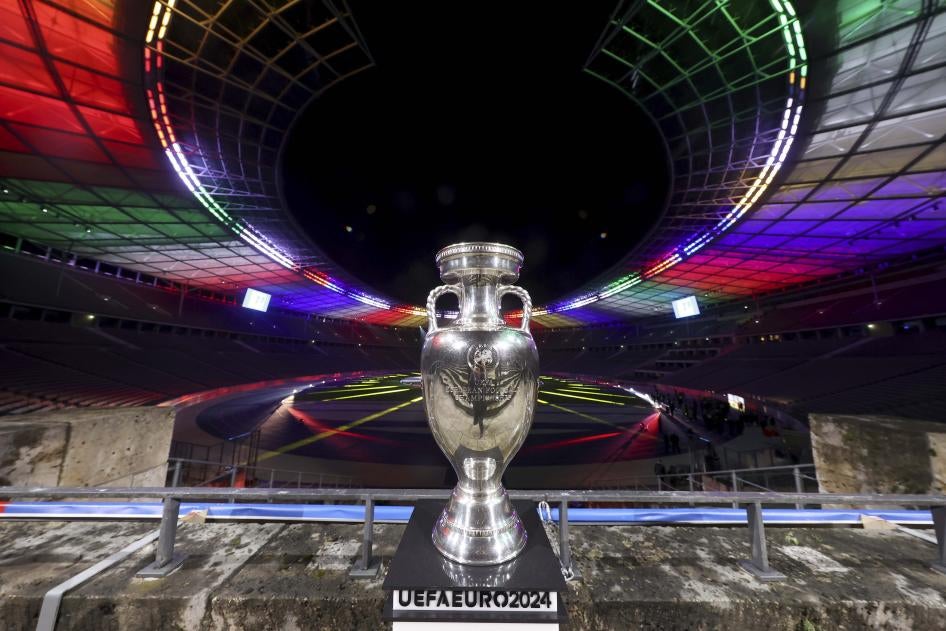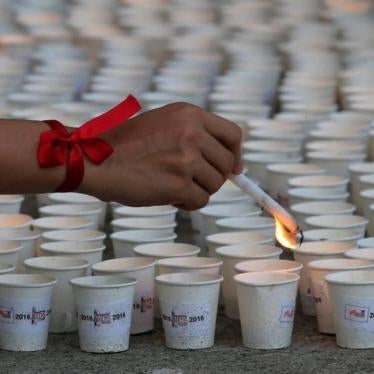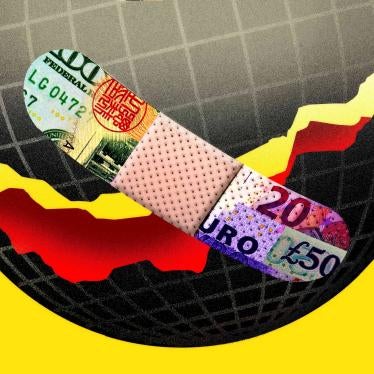(Nyon, Switzerland) – The Union of European Football Associations (UEFA) should live up to its human rights responsibilities and urgently address the gaps and inconsistencies in its new Football Sustainability Strategy 2030 released yesterday, the Sport & Rights Alliance said today. The strategy was approved by UEFA’s Executive Committee based on recommendations received as part of a flawed stakeholder consultation process.
The strategy does not address UEFA’s responsibilities under the UN Guiding Principles on Business and Human Rights to prevent, address and remedy human rights abuses committed in its business operations, and instead places human rights solely as a public relations matter.
“No matter what UEFA claims, the development of its human rights strategy did not entail a legitimate consultation process and it does not meet any international or European standards,” said Minky Worden, director of global initiatives at Human Rights Watch. “Stakeholder consultation is an essential element of human rights policy development. Not listening where there are serious human rights risks only means you won’t be able to address them. If you don’t know where your problems are, you have a problem.”
The 2022 UEFA Champions League Finals will be hosted in Saint Petersburg, Russia, the 2023 final match will be played in Istanbul, Turkey and the 2023 UEFA Europa League Final will happen in Budapest. UEFA’s Human Rights Strategy announced today fails to mention how it will address press freedom and journalists’ protection.
The Committee to Protect Journalists (CPJ) has reported in June 2021 that UEFA denied accreditations to at least 6 journalists seeking to cover the 2020 UEFA European Football Championship, citing the journalist’s failures to pass background checks by Russian and Azerbaijani authorities. Under pressure, UEFA later reversed two of those decisions.
“When UEFA contemplates staging tournaments in countries that regularly suppress a free media, this risk must be factored into their planning and addressed,” said Tom Gibson, EU Representative at Committee to Protect Journalists. “Press freedom is absolutely essential for a full, independent assessment of the facts around UEFA’s impact. Sustainability and protecting the environment are impossible if activists and journalists are arrested or prevented from doing their work.”
The Sport & Rights Alliance has on several occasions raised concerns during UEFA’s human rights strategy development process, both around the lack of meaningful engagement with potentially affected stakeholders and dangerous flaws in their approach of not consulting affected groups, including athletes’ unions, LGBT+ people, workers, fans, and journalists. Because the process has not been transparent nor integrated the views of the people most affected by UEFA’s operations, the Sport & Rights Alliance does not consider it to be legitimate and has asked to be removed from the list of organizations taking part.
“Thousands of workers depend on UEFA and its events for their employment, from supply chains providing UEFA merchandise through to people employed at the events themselves,” said Tim Noonan, Director of Campaigns and Communications at the International Trade Union Confederation. “UEFA’s lack of consultation and engagement gives no comfort that the fundamental rights of these workers will be respected.”
The global representative of professional football players FIFPRO has not been consulted, nor have any labor unions or workers’ representatives. In the strategy’s “football ecosystem” diagram, it fails to mention workers as part of the key stakeholders.
UEFA is an Advisory Council member of the Centre for Sport & Human Rights and has pledged to implement the Sporting Chance Principles, which include the commitment to give those affected by sport a voice in decision making through meaningful and ongoing engagement.
After pledging to uphold human rights, its new strategy shows UEFA has taken a significant step backwards and is not building on the progress made when including human rights criteria as part of the bidding process for the UEFA 2024 EURO. UEFA has also so far failed to clarify whether human rights criteria will be part of the UEFA EURO 2028 bidding process.
The Sport & Rights Alliance wrote to UEFA on September 7, 2021, October 18, and November 30 to express concerns around the lack of transparency and necessary information needed to have a meaningful consultation process and heard that it was not possible to open the full human rights policies due to timeline constraints.
“Without fans, players, journalists, workers and other stakeholders, UEFA doesn’t have a tournament,” said Andrea Florence, acting director of the Sport & Rights Alliance. “These are not groups you can simply ignore while supposedly mapping out a human rights strategy. An outcome that respects human rights can only be achieved through a process that genuinely respects human rights. Consultation with people who might be affected by UEFA’s operations cannot be just a box-ticking exercise–it should be an ongoing process, built on openness and transparency. Unfortunately, that’s not what we’ve seen from UEFA.”









